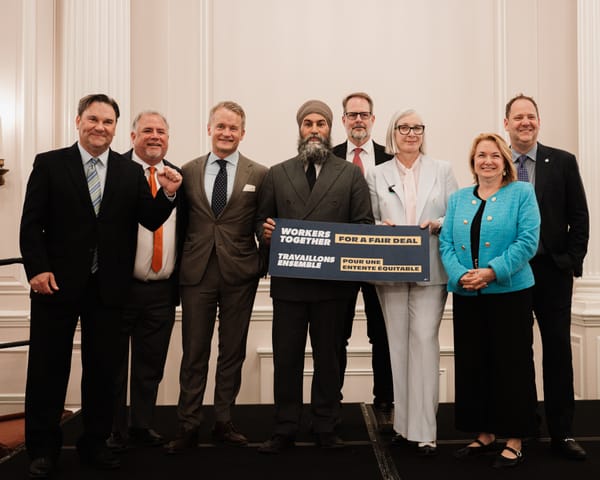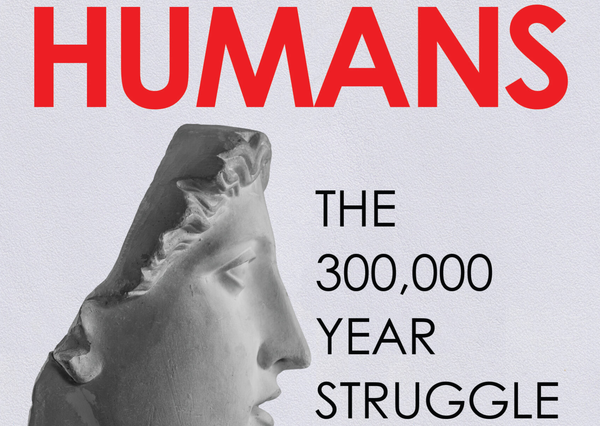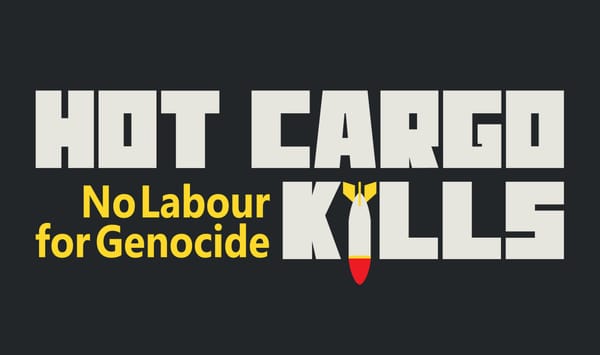
In this week’s Class Struggle newsletter, I had a conversation with Simon Black of Labour Against the Arms Trade Canada, a coalition of labour, peace and human rights activists seeking to bring attention to and end Canada’s role in the international arms trade.
Simon is an Assistant Professor in the Department of Labour Studies at Brock University.
Adam King: Can you tell us about Labour Against the Arms Trade (LAAT)? How did the coalition start and what is it aiming to accomplish?
Simon Black: We’re a grassroots organization made up of labour and peace activists working to bring an end to Canada’s participation in the international arms trade. We organize for a just transition for arms industry workers, and for arms conversion — the conversion of arms manufacturing capacity into socially useful production.
We take inspiration from the Lucas Plan, which was a plan developed by a joint shop stewards committee at Lucas Aerospace in the mid-1970s in Britain. Lucas was a large aerospace manufacturer making weapons for the British government and other governments, and the workers there — in the context of being threatened with lay-offs — came together and developed a plan for the conversion of Lucas’s manufacturing capacity into socially useful production.
This was a very detailed plan — a 500 page technical document. But they were really trying to develop a plan from the bottom up, to get workers thinking about their skills and capacities, their areas of specialization in the company, and the kinds of tools and machinery they had access to. So they developed plans for a number of alternative products that they could have produced at Lucas, based on the production capacities they had at the plant.
This was really groundbreaking because they were suggesting producing wind turbines and electric cars — they were very much ‘eco-pioneers’ in this sense.
AK: Hospital equipment such as ventilators as well.
SB: Absolutely. So it was about socially useful production but was also way ahead of its time, long before the labour movement had begun thinking about environmental issues and a just transition.
Of course, I am always reminding people when I say this that the Lucas Plan failed. This was under a Labour Government, and the democratic socialist parliamentarian Tony Benn was very supportive of it, but ultimately the whole Labour Party was not and the company was very hostile to the idea.
But LAAT sees in the Lucas Plan a vision for bringing arms industry workers into a conversation about not only ending Canada’s participation in the international arms trade but also about the possibility of alternatives.
AK: Canada’s arms sales to Saudi Arabia are a major focus of LAAT’s work, particularly in the context of the Saudis’ devastating war on Yemen. Tell us about how Canadian labour is implicated in arms exports to the Saudis.
SB: We were founded in the summer of 2019 and we started mostly as a rank-and-file campaign to convince the Canadian Labour Congress (CLC) to take a position against arms exports to Saudi Arabia.
The biggest arms deal in Canadian history is with Saudi Arabia. This is a $15 billion contract for Light Armoured Vehicles (LAVs) which was signed in 2014 by the Harper Conservatives. But the export permits were actually issued by the incoming Trudeau Liberal Government in 2015. And these exports have continued, even right through this past year during a global pandemic. At this point, Canada exports more arms to Saudia Arabia than any other country, except the United States.
Under this deal, defense contractor General Dynamics Land Systems Canada in London, Ont. (which is a subsidiary of GDLS in the U.S.) produces the LAVs for export to the Saudis. The workers in the plant in London are represented by Unifor.
So, we started with two goals: The first goal was to mobilize general labour movement opposition to these arms exports. On this, we’ve been somewhat successful in the sense that we did convince the CLC to take a public stand against these arms exports. And since the CLC signed on, we’ve also had many unions, including CUPE National and CUPE Ontario, CUPW, PSAC, Workers United Canada Council, and British Columbia Government and Service Employees’ Union, sign onto the campaign.
Now, we also work with other peace, humanitarian and human rights organizations, such as Amnesty International, Oxfam, Project Ploughshares and other groups. So, the second goal was to have this larger coalition make connections with the labour movement to be clear that they were also concerned about a just transition for arms industry workers.
In the various letters that we’ve sent as a coalition to the prime minister you can see this reflected in the concern that the government should end these exports and also secure the livelihoods of the workers who would be impacted by the cancellation of the arms deal.
In terms of these two goals — mobilizing the labour movement against these arms exports and getting the broader coalition to emphasize a just transition for workers — I think we’ve been successful. But we haven’t been successful in ending this arms deal with Saudi Arabia.
AK: Have you been able to apply pressure to or build relationships with NDP members of parliament?
SB: A number of NDP MPs have been very supportive of our work from the start — Niki Ashton, Leah Gazan, Matthew Green. Other NDP members of provincial parliament in Ontario have been supportive as well. The NDP itself has taken a position against the arms deals with Saudi Arabia. But, in its latest iteration, their position is that they believe the arms exports should be cancelled but they think the current contract should be fulfilled by the Canadian government.
That’s not our position. We want to see the exports cancelled immediately and public investment to convert arms manufacturing capacity into socially useful production.
But I do think that the NDP being more forthright with its opposition is the product of both pressure from within the party and seeing that there is this broader civil society campaign opposed to these arms exports. All told, these various labour, peace and humanitarian organizations represent millions of Canadians, so it’s significant.
AK: LAAT has engaged in direct action such as blocking rail lines and trucks transporting weapons. How effective has this been? What other tactics has LAAT engaged in?
SB: LAAT has engaged in direct actions alongside World Beyond War Canada — an anti-war organization. We’ve blockaded trucks at a transportation firm in Hamilton, Ont., which transports the LAVs from London to the Port of Baltimore. And we’ve also blocked rail lines close to the General Dynamics plant in London.
As part of a broader coalition against arms exports to Saudi, we’ve been signatories to open letters to Prime Minister Trudeau. We’ve had two national days of action where we did visits to Liberal MP constituency offices, as well as peace vigils outside the General Dynamics plant in London.
So, what effect has the direct action had? Well, this is an issue that the Canadian media has paid very little attention to. I think the outcome of the direct action is, first and foremost, to bring the issue back into the media spotlight.
It seems that without direct action the issue of arms exports to Saudi and Canada’s complicity in the humanitarian crisis in Yemen doesn’t get any traction. You can send four letters to the prime minister with 39 different civil society organizations signing on, representing millions of Canadians, and have it not get covered at all by the media. But if you block a truck contracted to ship these weapons to port, then we can get their attention.
So, it’s not that we’ve been able to stop the LAVs in their tracks or on their wheels, it’s that this tactic has been able to put attention on the issue.
AK: Have you been able to establish relationships with workers inside of the plant?
SB: We’ve tried on multiple occasions to reach out to the leadership of the union inside the plant. LAAT has sent letters, both to the national leadership of Unifor and to the leadership of the Unifor Local 27, Unit 66 at the plant. Unfortunately, we haven’t had any response.
We’re not terribly surprised by this. Unifor itself has been very quiet about this issue. Even when we’ve tried to go through the London and District Labour Council, we haven’t been able to convince the leadership of the union local to meet with us and discuss the issue
AK: LAAT makes a point of emphasizing a just transition for workers who currently work in arms manufacturing. Why is this so important and how do you see this just transition related to the green transition?
SB: The workers at General Dynamics are highly skilled workers. They’re well-paid. Through a union contract they’re able to build a good life for themselves and their families. And this is in an area — London — that has been hit hard by deindustrialization. I was in London in 2012 protesting the shutdown of the Caterpillar plant which was moved to a right-to-work U.S. state.
So you can understand why workers at this plant would be nervous about GDLS losing this contract.
Unfior came out recently saying that Trudeau’s climate targets need to be more ambitious, at the same time as we must guarantee a just transition and secure livelihoods for oil and gas workers.
This is the starting point with workers in any industry where production is harmful to humanity or the planet. Workers have to know that they will be secure in their livelihoods before you can broker a conversation about passing policies, or even being part of a campaign, that could directly affect their ability to put food on the table or pay their rents or mortgages.
This is central to involving labour in discussions about what a Green New Deal could look like in so-called Canada. LAAT very much sees our work connected to a potential Green New Deal that would not only see a shift away from a carbon-based economy but would also see a shift away from an economy dependent on arms exports to places like Saudi Arabia — or even to the United States for that matter.
AK: What’s next for LAAT and how can people get involved or support LAAT’s work?
SB: People can follow us on Twitter @LAATCanada. We’re also on Facebook, so you can like and follow us there. Anyone who wants to get involved can reach out to us on either of those platforms.
We’re looking for union members to represent Labour Against the Arms Trade at their local labour council and within their union. We’re starting to develop a network of representatives in unions and labour councils. If people want to get in touch and get involved, please do so.
One thing I have to say that we’re proud of is that last year we received a letter from the Yemeni Confederation of Trade Unions in recognition of our work. International solidarity is very important to us and at a low point in the campaign, this recognition kept us going.
The last thing I want to say is that — even though we have not stopped these arms exports, and the humanitarian crisis in Yemen is so grave — one glimmer of hope was in 2018 when there was a peace picket set up in the Port of Saint John in New Brunswick.
The national Saudi shipping company had a ship offshore that was coming to pick up LAVs. Local peace activists in Saint John set up the picket very early in the morning. When the dockworkers, who are members of the International Longshoremen’s Association, showed up that morning, they respected the picket line. And at least for one day, LAVs didn’t get loaded onto those ships because those workers refused to cross the peace picket line.
I think that’s a great example of how workers can throw sand in the gears of the war machine, and could, tomorrow, bring an end to these arms exports.
Of course, the employer has now taken the union local to the Canadian Industrial Relations Board, for essentially engaging in a ‘political strike.’
So there are consequences that make it difficult to engage in these types of actions. But all along the supply chain of arms manufacturing and shipping and logistics are union members with real structural power. Realizing that power to build a better, more peaceful world is our goal.
The struggle continues.






